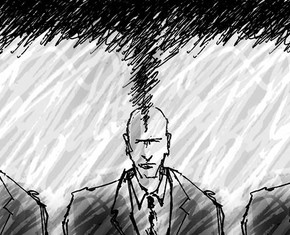The views expressed in our content reflect individual perspectives and do not represent the authoritative views of the Baha'i Faith.
In the small California town where I live, my community has witnessed a raging debate over tough pandemic restrictions during the past year – exactly like many other places around the world.
Nobody likes having to wear masks and close businesses and maintain “social distancing,” – a noxious oxymoron if I’ve ever heard one – although for the most part, the community here has begrudgingly complied.
RELATED: Why the Lessons of COVID-19 Give Me Hope for Global Unity
But in our local newspaper last week, I read a succinct one-sentence quote that summarized the entire debate. A well-known restauranteur who has kept his establishment open despite the new rules and restrictions told county elected officials: “I’m not going to cooperate with my own destruction.”
I understand his hesitance. The business he’s worked hard to build, which supports his family, employs many, and gives a benefit to the town not only with its excellent food but with its tax dollars, faces permanent closure if COVID-19 restrictions continue much longer. These pandemic restrictions have significant real consequences for some, and will likely force many businesses to close permanently, leaving employees without work and devastating certain segments of our economy.
This fracture in our social structure over pandemic measures has played out across the planet. In just about every nation and every city and town, we’ve seen conflict arise between those in the business community who want to do as much as possible to keep commerce afloat, and those in the public health community who want to shut much of it down in order to stem the tide of disease and save lives.
Let’s take a step back, though, and consider the whole issue from a broader, more spiritual perspective.
Multiple scientific studies have shown that the coronavirus spreads most rapidly in crowded indoor spaces without sufficient ventilation where people without masks eat, drink, and socialize together. These gatherings, then, have the most extreme anti-social repercussions imaginable – they kill people.
We now know, more than a year into this terrible pandemic, that public health measures to stop the transmission of the disease work. At this point everyone has memorized the script: wash your hands frequently, wear a mask (or two), avoid getting together with people outside your immediate household, maintain that six feet of separation we all despise. If we do that, we save lives.
Do We Save Lives or Save Businesses?
So what’s more important? Do we save lives, or save businesses? Some may argue the details, but that’s the basic equation this heated debate really boils down to. Ultimately that equation raises a powerful moral question, and for guidance on questions of morality civilization generally turns to the spiritual teachings and laws of religion for answers.
In the Baha’i teachings, these profound answers were revealed by Baha’u’llah, the prophet and founder of the Faith:
By the righteousness of the Lord! Ye were created to show love one to another and not perversity and rancour. Take pride not in love for yourselves but in love for your fellow-creatures.
It is Our wish and desire that every one of you may become a source of all goodness unto men, and an example of uprightness to mankind. Beware lest ye prefer yourselves above your neighbors.
Like all of the great prophets and spiritual teachers throughout history, Baha’u’llah counseled us to love one another and prefer others above ourselves.
Those teachings aren’t just nice nostrums or abstract ideals – for Baha’is, Baha’u’llah’s spiritual laws provide humanity with a framework for the architecture of a new era in human history. They counsel everyone to do their utmost to take care of one another. Rather than operating on the idea of the survival of the fittest – the law of the jungle, where we all fight everyone else for what we can get – Baha’u’llah’s teachings advise us to build a global culture of empathy and kindness, of unity and oneness, of cooperation and concern and heightened regard for the welfare of others.
So it would seem that the Baha’i teachings privilege public health over private business, right?
Not so fast. Baha’u’llah also taught that: “The best-beloved of all things in My sight is Justice …” Which raises this question: how is it just to let some sectors of our economy suffer, bearing the brunt and pain of the pandemic and its public health restrictions, while other sectors flourish? Why do restaurants and theatres and musicians and other brick-and-mortar businesses in public-facing sectors need to choose between their livelihoods and the health of the public?
The Baha’i teachings say that fairness and justice on this physical plane of existence are the responsibilities of the world’s rulers and governments. In a talk he gave in Paris in 1911, Abdu’l-Baha, the son and successor of Baha’u’llah, said: “The government of the countries should conform to the Divine Law which gives equal justice to all.”
So the equal justice solution here, it would seem, involves not only following and enforcing serious science-based public health measures, but also, through governmental intervention, supporting the businesses and the workers those measures have negatively impacted.
RELATED: Your Life or Your Job: What Workers Risk in the Pandemic
Some of the world’s more enlightened countries have already taken steps in this direction, providing businesses and public institutions and their employees with sufficient resources to ride out the crisis. In the United States and in several other nations that hasn’t happened yet, or has only happened partially in some cases. Clearly, we need to do more as a society to support one another.
Here’s a Baha’i-inspired idea: what about accomplishing that goal by temporarily taxing businesses that have flourished during the pandemic, and using that revenue to help those most hard-hit by the restrictions?
For example: web-based mega-corporations have certainly flourished during pandemic quarantines because online commerce has largely supplanted in-person shopping – so why not assess a temporary fee on those excess Covid-related profits, and then distribute those funds to the most-affected businesses and their owners and employees?
Creative solutions like this could give everyone the sense that they no longer need to live by the law of the jungle – that we truly are all in this together.
To reach the standards of love and justice the Baha’i teachings call for, humanity as a whole must pursue joint solutions to these shared problems, so we can all recover, both materially and spiritually, from the ravages of this virus.
Those simple actions will protect us, as evidenced by the fact that the countries implementing them most rigorously have succeeded in avoiding the worst consequences of the pandemic.
















Comments
Sign in or create an account
Continue with Googleor